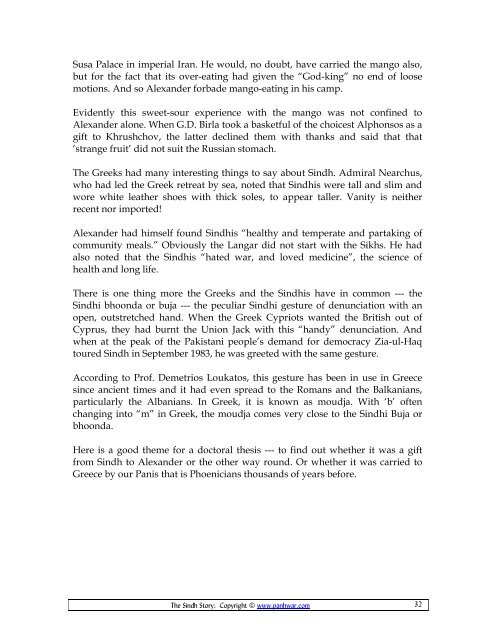You also want an ePaper? Increase the reach of your titles
YUMPU automatically turns print PDFs into web optimized ePapers that Google loves.
Susa Palace in imperial Iran. He would, no doubt, have carried the mango also,<br />
but for the fact that its over-eating had given the “God-king” no end of loose<br />
motions. And so Alexander forbade mango-eating in his camp.<br />
Evidently this sweet-sour experience with the mango was not confined to<br />
Alexander alone. When G.D. Birla took a basketful of the choicest Alphonsos as a<br />
gift to Khrushchov, the latter declined them with thanks and said that that<br />
‘strange fruit’ did not suit the Russian stomach.<br />
The Greeks had many interesting things to say about Sindh. Admiral Nearchus,<br />
who had led the Greek retreat by sea, noted that Sindhis were tall and slim and<br />
wore white leather shoes with thick soles, to appear taller. Vanity is neither<br />
recent nor imported!<br />
Alexander had himself found Sindhis “healthy and temperate and partaking of<br />
community meals.” Obviously the Langar did not start with the Sikhs. He had<br />
also noted that the Sindhis “hated war, and loved medicine”, the science of<br />
health and long life.<br />
There is one thing more the Greeks and the Sindhis have in common --- the<br />
Sindhi bhoonda or buja --- the peculiar Sindhi gesture of denunciation with an<br />
open, outstretched hand. When the Greek Cypriots wanted the British out of<br />
Cyprus, they had burnt the Union Jack with this “handy” denunciation. And<br />
when at the peak of the Pakistani people’s demand for democracy Zia-ul-Haq<br />
toured Sindh in September 1983, he was greeted with the same gesture.<br />
According to Prof. Demetrios Loukatos, this gesture has been in use in Greece<br />
since ancient times and it had even spread to the Romans and the Balkanians,<br />
particularly the Albanians. In Greek, it is known as moudja. With ‘b’ often<br />
changing into “m” in Greek, the moudja comes very close to the Sindhi Buja or<br />
bhoonda.<br />
Here is a good theme for a doctoral thesis --- to find out whether it was a gift<br />
from Sindh to Alexander or the other way round. Or whether it was carried to<br />
Greece by our Panis that is Phoenicians thousands of years before.<br />
The Sindh Story; Copyright © www.panhwar.com<br />
32


